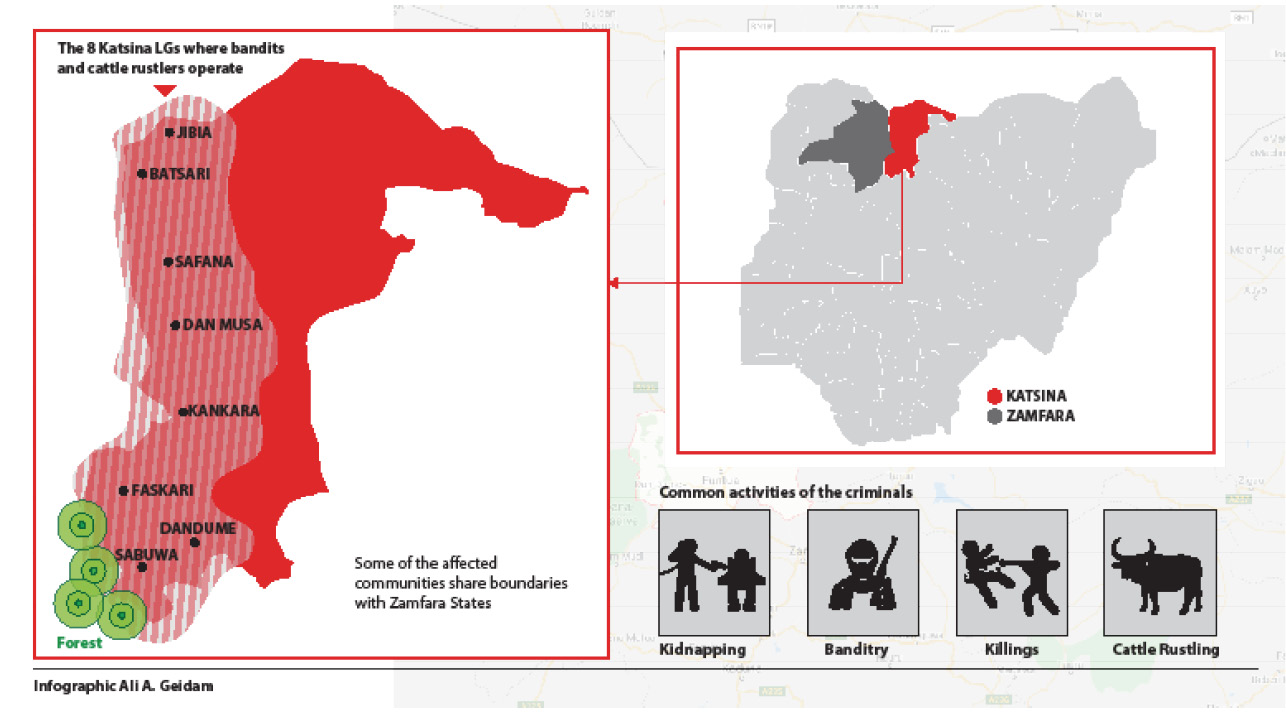Over seven years ago crimes related to cattle rustling emerged in Nigeria across many states. Gunmen with automatic weapons stormed settlements, with a misplaced sense of military fraternity, killing and taking cattle away.
In 2013, for instance, armed gunmen stormed the commercial farm owned by the then Vice President Namadi Sambo, along Birnin Gwari road in Kaduna State and took away over 1,000 cattle worth more than N100 million. In a similar incident, another group of rustlers invaded the farm of the Emir of Zazzau, Alhaji Shehu Idris, in Zaria and made away with over 200 cattle worth millions of naira.
Robberies in high-profile farms, along with constant reports of ruthless killing of cattle owners, left the herdsmen between the devil and the deep blue sea: between the farmers and the diabolic rustlers. The situation left many herdsmen without cattle.
Security Risk Management and Intelligent Specialist, Kabiru Adamu, says cattle rustling is a criminal activity that was driven from the beginning by three things.
“Number one is the reward from the activity. When it started the target was to steal cows and sell them and because the Nigerian market for livestock was open the criminals that were behind it were selling into those markets. For example, they would steal from the north and sell in the southern states where it was easy for them to get access.
“Over time government regulators reduced that ability. But then what happened was that corrupt middlemen were still allowing rustled cattle into the value chain so the crime continued. The second point is the ability of criminals to carry out that activity. For instance that activity is determined by weapons possessed. If the criminals go into communities where Fulani are they used their weapons killed the people and rustled their cattle. Then, of course, they would go and sell same,” he said.
According to Adamu, the last determination is the desire of the criminals to commit the offence. “In this instance, we reportedly saw corroboration between the criminals in southern Nigeria and their counterparts in Northern Nigeria whereby those in the south who have a long history of criminality were selling these ideas to the criminals in the north.
“So it became an organized crime where you had collaboration between different elements; those that would steal, those that would sell and, of course, the laundering of the money became an issue. To an extent, even the weapons were being gotten from security agencies. So clearly it was an organized crime.”
Task Force on Cattle Rustling
Daily Trust reports that prompted by incessant cattle robbery cases, the former Inspector General of Police, Suleiman Abba, constituted a “Task Force on Cattle Rustling and Associated Crimes” to checkmate the rising cases in all the six geopolitical zones of the country.
The Task Force, which had an Assistant Commissioner of Police as its Commanding Officer, had Tactical Units at each of the six geo-political zones of the country and was saddled with pre-emptive intelligence gathering, anti-cattle-rustling and allied crimes patrols cum operations as well as the investigation and possible prosecution of reported incidents of cattle rustling.
Although it was expected that the effective functioning of the new Task Force would whittle down the menace of cattle rustlers, which had adversely led to untold ethnoreligious and communal conflicts in the affected areas, not much impact was made as the attacks continued to mount thereafter.
A security expert, who preferred to remain unnamed said, rather than solve the problem the Task Force on banditry established in 2014 became the precursor to the banditry that is currently ravaging parts of the country.
“This is for the simple reason that when the Fulani communities reported cattle rustling to the Police the response was not too encouraging. In most instances what happened was that the victim became the accused where the police would now extort the victim and it was out of that anger that we now saw more Fulani trying to arm themselves,” said the source.
Consequently, states like Benue, Plateau, Kwara, Nasarawa, Taraba, and the federal capital territory (FCT) became safe havens for criminal elements who were hell bent on wiping out the age-long traditional occupation of the Fulani.
Nagging questions from cattle rustling
Indeed, cattle rustling in these states had raised several questions at the time: if all the cattle were rustled, what next? Who were these rustlers? Who were the buyers of these stolen cattle? And why had they become powerful? Were the robbers more tactical in the crime than security forces fighting them? Or were there untouchable masked men behind them?
Alhaji Haruna Boro Hussaini the then chairman of Miyetti Allah Cattle Breeders Association of Nigeria, Plateau State chapter, reportedly revealed in an interview in 2015 that between 2013 and 2015, 28,000 cattle had been rustled and 264 herdsmen killed by rustlers.
Worried that they had completely become helpless as the security forces could not stop the carnage, Hussaini lamented:
I just have to tell you the truth; our security forces are not helping us at all. Even if we report to them where our cattle have been taken to or where the rustlers are, the response we get from them is that they cannot go there.”
Hussaini had warned that if adequate measures were not taken to forestall the crime, the situation might snowball into something that the country would take many years and resources to control with devastating consequences.
“Some of our young men are now moving around without cattle because they have been robbed. What do you think people like them will do in the future? They will begin to commit crimes,” Hussaini said.
Although analysts say rustling has not actually ended, they agree that the dynamics have changed mainly because it is a bit more difficult for the criminals to carry out their activities. “What they now do is they still raid villages and carry out other criminal activities, said Adamu.
As one analyst puts it: “Unless there are adequate measures taken to address the the menace of cattle rustling and related crimes such as banditry and kidnapping, more problems will arise and possibly destabilise the nation.”

 Join Daily Trust WhatsApp Community For Quick Access To News and Happenings Around You.
Join Daily Trust WhatsApp Community For Quick Access To News and Happenings Around You.

